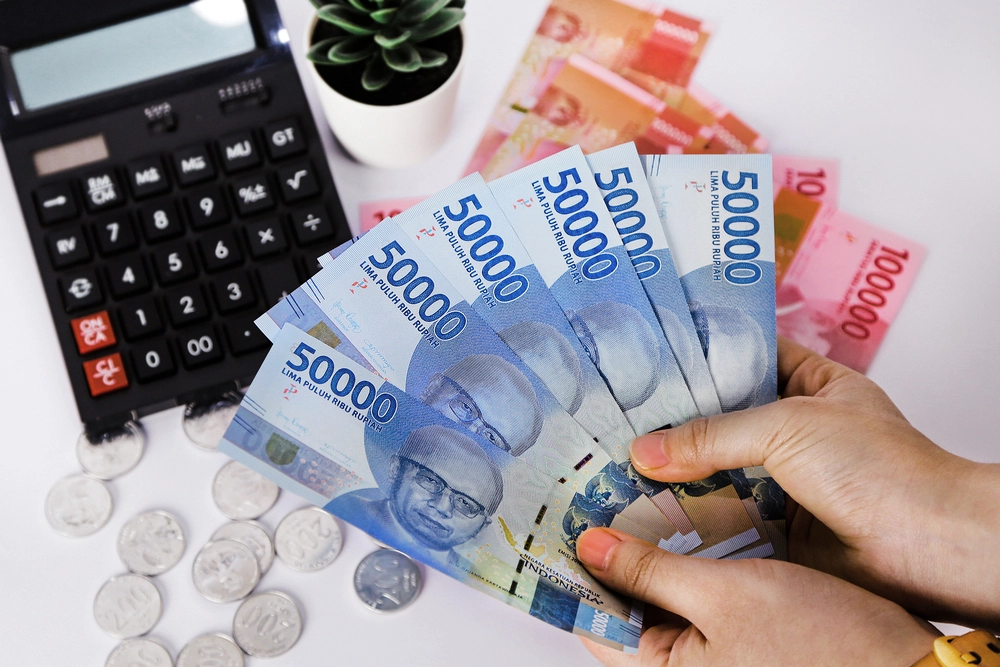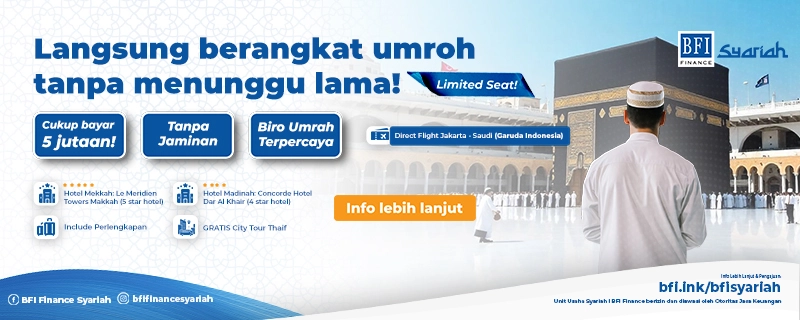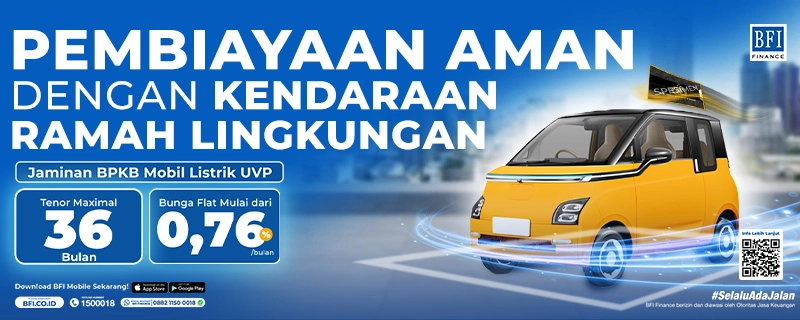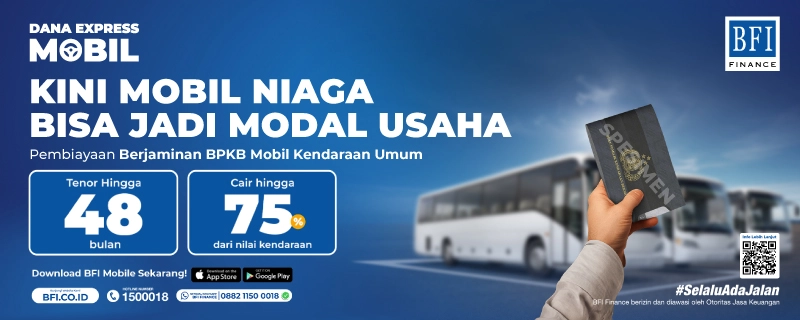Sobat BFI, a mortgage is a form of financial transaction to obtain money by pledging goods owned by prospective borrowers or debtors. This financial activity has become very popular in the community, especially at times like now when the needs of life are very diverse.
Nevertheless, do you understand what a mortgage really is?
1. What is a Mortgage?
According to KBBI (Kamus Besar Bahasa Indonesia), a mortgage is borrowing money within a certain time limit by submitting goods as dependents, if it has arrived at the time it is not redeemed, the goods become the rights of the lender.
Meanwhile, according to OJK (Financial Services Authority of Indonesia) what is meant by a pawn is mortgage rights on movable goods; collateral must be separated from the power of the debtor. The meaning of movable property is an object or goods that can be moved.
From the above understanding, it can be concluded that a mortgage is a financial transaction activity between two parties consisting of the borrower (the debtor) and the lender (the creditor) with collateral in the form of movable goods.
In Indonesia, pawning has been around for a long time but formally only existed in 1901.
Also Read: Apply for a Loan Through BFI Finance Now!
2. The Mortgage Law in Indonesia
The legal basis for pawning in Indonesia is contained in the Civil Code, namely articles 1150-1160. And specifically, the regulations are regulated in POJK NO31/POJK.05/2016.
Each of the existing articles regulates the giving of a mortgage, the rights, and obligations of the mortgage, the prohibition of the misuse of goods by the recipient of the mortgage, to the sale of mortgage goods (auctions).
3. Types of Mortgages
Mortgages are divided into 2. They are conventional and sharia.
3.1 Conventional
A conventional mortgage is one type of pawn that is commonly found in the community and has clear rules, in accordance with the provisions of the Financial Services Authority (OJK).
The way it works is that the prospective borrower or debtor submits a guarantee in the form of goods to the creditor with the estimated value of the goods for further checking prior to the disbursement of the loan money.
After the check has been completed, the final step is to make an agreement regarding the repayment date of the loan and the interest to be paid.
3.2 Sharia
The sharia type of a mortgage is actually almost the same as the conventional type. The difference is the mortgage system is used in accordance with Islamic law. Among them are:
1. Al Murhun
This means that the mortgage goods are halal goods and can be traded.
2. Al Marhunbih
The amount of loan money that must be repaid in accordance with the loan amount. This indicates that there is no interest or additional fees.
3. Sighat
There is an ijab qabul at the time of the pawn contract.
4. People who are committed
Both parties, between the borrower (Rahin) and the lender (Murtahin) must be people who are mature and have common sense.
4. The Nature of Mortgage
Referring to Badrul Zaman (1991), mortgages have six general characteristics, they are:
1. Pledged goods are tangible or intangible movable objects, such as billing rights
2. There is material nature, meaning that the debtor or borrower is able to provide guarantees to the creditor that the existing loan must be paid from the value of the collateral
3. The power of mortgage goods is owned by the creditor or the holder of the pawn
4. Creditors have the right to sell pawned goods
5. Mortgage is the first right
6. The liens are subject to the principal agreement agreed
5. The Advantages and Disadvantages of Mortgages
The advantage of a mortgage is that there is an official institution that regulates applicable legal provisions. For example, the rules set by OJK (Financial Services Authority of Indonesia). This allows anyone to avoid unwanted things such as fraud or acts of extortion.
As for the drawbacks, pawns have additional costs in the form of relatively higher interest than banks. This is of course quite risky in the occurrence of payment failures.
6. List of Items That Can Be A Mortgage and Not
6.1 Items that can be a mortgage
According to Finnacial Services Authority of Indonesia (OJK),
The following is a list of goods that can be used as guarantors or mortgages.
1. Precious Metals
Examples are gold, diamonds, gems, and diamonds.
2. Vehicle
Vehicles are one of the goods that can be pawned because they have a sale and purchase value. To make a vehicle as collateral or as a mortgage, you can include vehicle documents such as STNK (Surat Tanda Nomer Kendaraan), BPKB (Buku Pemilik Kendaraan Bermotor), and also a purchase invoice.
3. Certificate
Goods that have the next sale and purchase value that can be a mortgage are valuable documents. For example, a land certificate, where the value of the loan to be obtained will be calculated from the value of the Land and Building Tax (PBB) and how strategic the position of the house is.
4. Electronic Equipment
Electronic equipment can also be a mortgage for example televisions, refrigerators, cameras, laptops, and other valuable electronic items. Later the value of the existing pledge is determined by the condition of the goods. The better and the latest release, the better the value will be.
5. Stock
6. Machine
Certain machines can be used as collateral to be mortgaged. Such as tractors, generators, water pumps, and much more.
7. Textile
Tapestry, Fabric, and Bed linen with a high selling value.
8. Accessories
Out there there are accessories with a high selling value. Accessories in this category can also be pawned. These include bags, shoes, watches, wallets, and others.
6.2 Items that cannot be a mortgage
For goods that cannot be pledged or used as collateral, they are as follows.
1. Office inventory or government property.
2. Items that are perishable and have an expiration date or expiration date. Examples are food, drink, and medicine.
3. Goods whose circulation is prohibited or violates the law, such as narcotics.
4. Items that are flammable or harmful to the environment
5. Items with an estimated value that is difficult to determine, such as antiques or rare items.
7.1 Characteristics of Legal and Illegal Mortgage Companies
Sobat BFI, ss we already know, pawn companies have existed for a long time and have experienced a significant increase in line with the increasing needs of the community. Therefore, it is better for us to know the characteristics of a good or legal pawn company in order to avoid bad things. The following are the characteristics of a pawn company that has obtained an OJK (Financial Services Authority) permit:
1. Have a personal storage area for the pawned goods
2. There is an estimated value of goods that have been certified
3. Rational interest rate
4. Excess money from the auction of collateral items is returned to the borrower of funds
5. Items pawned by the debtor will be insured to avoid unwanted risks
6. The issued pledges must meet the OJK (Financial Services Authority) standards
Illegal Company
Along with the increasing popularity of mortgages today, many illegal companies have emerged. Of course, we should be wary of this, considering that something illegal gives more losses than gains. Here are some things that Sobat BFI needs to remember regarding the characteristics of illegal pawn companies.
1. No personal storage for the mortgage goods
2. Estimated value of uncertified goods
3. Applicable interest rates tend to be high or arbitrary
4. No transparency & refund related to excess auction money for collateral items
5. Items by the debtor are not insured
6. Not having a business license from the Financial Services Authority (OJK)
8. Things to Pay Attention to Before Pawning
There are a few things you need to consider before mortgaging an item. Among them are as follows:
8.1 Understanding Risks
All things have their own risks including a mortgage. When you mortgage valuable items, you are at great risk of losing the item if you are unable to repay the loan within the agreed time.
8.2 Calculating the Value of Valuable Objects to be Mortgage
Before mortgaging goods as collateral for a loan, existing goods must meet one of the mandatory pawning requirements, namely having a sale and purchase value. This is based on the determination of the pawn if you cannot pay off the loan according to the maturity period, then the pawned item will be auctioned.
8.3 Mengikuti Prosedur Gadai
Secara praktiknya, kita hanya perlu memberikan benda jaminan untuk memperoleh pinjaman. Namun, perlu kita cermati juga bahwasannya ada prosedur-prosedur lain yang wajib diikuti sebelum memperoleh dana pinjaman.
Antara lain: berapa lama waktu yang diberikan untuk pelunasan, sistem pengembalian dana, dan apakah ada kewajiban lain yang harus diikuti bagi peminjam atau debitur.
8.4 Pay Attention to the Terms of the Mortgage
Each finance company has its own provisions. One company to another can be very different. Therefore, it is important for you to be clear.
For example, in company A you can get a loan of up to 7 million with a tenor of 5 years. Whereas in company B you need to attach certain documents such as personal identity and collateral which has the same value as the amount of money to be borrowed.
9. Rights and Obligations of the Pledgeholder
9.1 Pledgeholder's Rights
As a pledgeholder, you have several rights. Among them are in the form of the right to sell the pawned goods either independently or represented by the judge, fully control the mortgage object with the permission of the judge, and obtain restoration, compensation, and legal rights to take precedence.
9.2 The Rights of Pledgeholder
As for the holder of the pawn, the rights owned include responsibility for damage or loss of pawned goods and being responsible for the proceeds of the sale. Another obligation is a bond or agreement related to an agreement to borrow money.
Sobat BFI, that's an explanation of what a pawn is. It is hoped that the above explanation can provide new insights and be useful for all readers.
BFI Finance is a company that provides multi-purpose loans with guarantees for motorbike bpkb, car bpkb, and house or shophouse certificates






